PRESIDENCY
Round-up of activities of President Park in foreign relations
President Park Geun-hye active in summit dip-
lomacy, boosting Korean image overseas
President Park Geun-hye has been very active in the promotion of the image of the Republic of Korea overseas with summit diplomacy and involvement in various activities related with foregin countries receiving the visiting foreign Heads of State and Government and other important figures from around the world and ambassadors accredited to Korea. Excerpts from the Presidential activites follow:
President Park meets with Kazakh Prime Minister Serik Akhmetov
President Park Geun-hye stressed that the Republic of Kazakhstan is an important partner to Korea in economic collaboration as well as in its efforts to help expand Eurasian cooperation and carry out a diplomatic policy toward Central Asia that seeks mutual benefit and cooperation.
Highlighting the significance of the visit by the Prime Minister Serik Akhmetov of the Republic of Kazakhstan only three months after the summit between Korea and Kazakhstan on the sidelines of the G20 Summit in September, President Park proposed that the two countries continue to further close friendly cooperation in the coming years and beyond.
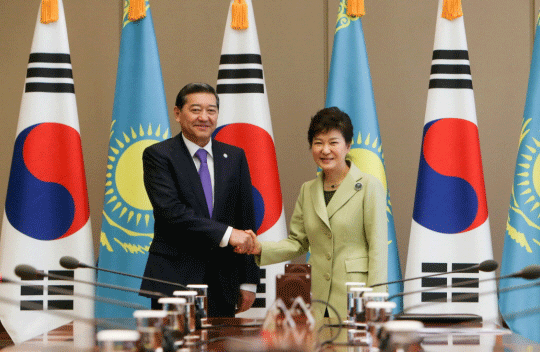
President Park remarked on the steady progress in implementing what was agreed upon at the September summit, including the seamless procedures for carrying out large-scale projects worth US$10 billion in energy, resources and infrastructure as well as the expansion of participation by Korean businesses in preparations for the Astana Expo 2017. She also asked the Kazakh Government to work more actively together with Korea to boost cooperation in such areas as IT, high-tech transportation technology and new and renewable energy.
Noting that there has been much progress in the large-scale economic cooperation projects, including the construction of the Balkhash coal-fired thermal power plant and a petrochemical complex in Atyrau and oil exploration in the Zhambyl oil field, President Park asked the Kazakh Government to take interest in and render support in a consistent manner for their smooth implementation in the future.
In response, Prime Minister Akhmetov said that Korea was a major partner and a role model as well in carrying out the aforementioned three projects, policies for the diversification and modernization of its industries and other national development plans. The Prime Minister expressed the hope that bilateral economic cooperation would be further expanded through increased trade and investments as well as infrastructure development projects.
Prime Minster Akhmetov continued to express hope that Korean businesses would take part in constructing a nuclear plant and manufacturing automobiles in his country. Saying that many people in his country have high interest in Korea’s medical services, culture and tourism, the Prime Minster also added that he looked forward to having consultations to discuss ways to promote bilateral cooperation in the tourism sector.
President Park stressed the need to establish an institutional basis for efforts to resolve the difficulties facing Korean companies entering Kazakhstan and also to further promote bilateral economic cooperation. She said she looked forward to concrete progress with regard to the opening of a Korea-Kazakhstan economic cooperation office and the timely conclusion of an agreement on temporary work arrangements, and Prime Minister Akhmetov also expressed his strong anticipation for the same.
Prime Minister Akhmetov presented President Park with an invitation from President Nursultan Nazarbayev for her to visit Kazakhstan, and he said that he hoped she would visit in 2014. In reply, the President said she too hoped to be able to visit the country at a mutually convenient time.
Today’s meeting provided an opportunity to strengthen the basis for bilateral cooperation through efforts to implement various ongoing cooperative projects more systematically. The discussions were also assessed as having contributed to developing in concrete ways the vast potential for mutual cooperation between the two countries.
President Park meets with delegation from Stanford University
Welcoming the APARC delegation made up of specialists on the Korean Peninsula and in North Korean affairs, President Park noted that the Strategic Forum, first convened in 2006, has provided crucial opportunities for researchers from both Korea and the United States to engage in in-depth discussions about Korea-U.S. relations and developments surrounding the Peninsula and in Northeast Asia.
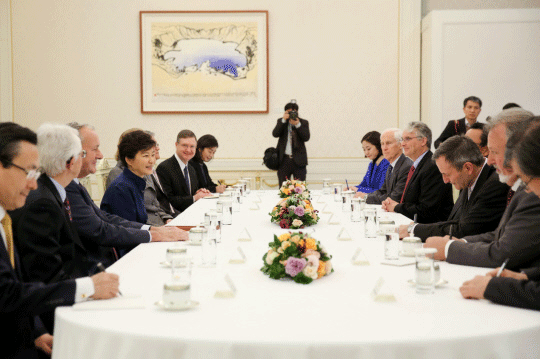
The APARC delegation expressed its commitment to continuing endeavors to ensure that the Strategic Forum would contribute to the advancement of the Korea-U.S. alliance and the promotion of peace and stability in Northeast Asia.
President Park said the Forum is being held at a very opportune time when peace and stability on the Korean Peninsula and in Northeast Asia are more important than any time before. She expressed the hope that there would be useful discussions during the Forum.
In response, the members of the visiting delegation said they anticipated that the Forum would allow for a fruitful exchange of diverse opinions about relevant issues. They added that they hoped the various proposals put forward in discussions would be applied to great benefit in the policymaking by both countries’ governments.
President Park next stressed the importance of trust in promoting peace and stability in Northeast Asia. She explained that the Korean Government is pursuing the Trust-building Process on the Korean Peninsula and the Northeast Asian Peace and Cooperation Initiative as policies to transform the Peninsula and the region into sites of trust and cooperation, and she asked for support for their implementation. To this, the delegation members gave their assurance of understanding and support.
President Park went on to note that the Korea-U.S. alliance, which is celebrating 60 years this year, has served as a lynchpin for peace and stability on the Korean Peninsula and in the Asia-Pacific region. She said that with the clear goal of further developing this comprehensive strategic alliance and a strong commitment to it as well as public support, the Korean Government would continue to make active efforts to strengthen the bilateral partnership.
President Park meets with U.S. Vice President Joseph Biden
President Park Geun-hye noted that the Korea-United States alliance, which has been the most integrated and closest alliance over the past 60 years, has served as the lynchpin for stability and prosperity in the Asia-Pacific region. She went on to propose that the two countries continue to step up efforts to crystallize the comprehensive strategic alliance founded on the Joint Declaration in Commemoration of the 60th Anniversary of the Alliance between the Republic of Korea and the United States of America, which was adopted this past May by the two heads of state.
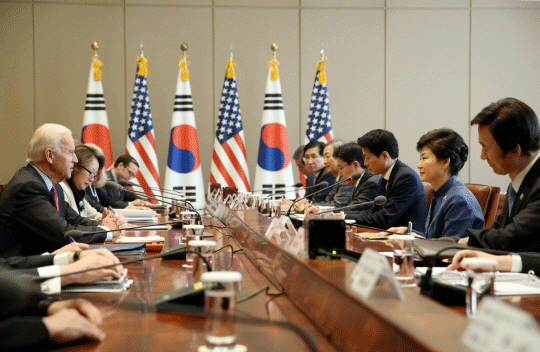
Vice President Biden emphasized that the U.S. commitment to the defense of the Republic of Korea is firm, and its decision to rebalance to the Pacific Basin is not in question. He continued to note that the Korea-U.S. alliance, which is playing a key role in the rebalancing policy, has served as the foundation for increased efforts for cooperation in Asia and beyond as a global alliance. He also proposed that the two countries work together to advance cooperation and mutual support in a variety of fields.
Vice President Biden welcomed the fact that the Korean Government announced its interest in joining the Trans-Pacific Partnership (TPP). President Park responded by saying that the United States and Korea should continue to work together so that relevant consultations proceed seamlessly.
In regard to major pending issues between the two nations, including a revision to the Korea-U.S. nuclear cooperation agreement, defense cost sharing and the implementation of the KORUS FTA, President Park and Vice President Biden noted that bilateral discussions to hammer out solutions are proceeding in a constructive manner on the basis of mutual trust. Importantly, they reaffirmed that the transfer of wartime operational control should be carried out in a way that would further reinforce Korea-U.S. combined defense capabilities.
President Park and Vice President Biden gave a high evaluation of the steadfast cooperation between the two nations to achieve the denuclearization of the North and came to an agreement to redouble their efforts to realize concrete progress in that regard on the strength of watertight cooperation in dealing with matters related to the North and the unwavering deterrence against the North.
Noting that China is also making efforts to that end with its principle of zero tolerance for the North’s nuclear program, as evidenced by its emphasis on the importance of the North strictly fulfilling the UN Security Council resolutions, President Park and Vice President Biden concurred on the necessity to continue their efforts together with China and other member nations of the Six-party Talks to help the North demonstrate its genuine commitment to denuclearization through action.
President Park explained the Korean Government’s stance on the issue of the Korea Air Defense Identification Zone, to which the Vice President responded by saying that he appreciated the President’s explanation and the nation’s efforts. They agreed to continue close consultations on the issue in the days ahead.
Based on the shared understanding that it is important for the nations in Northeast Asia to work together for peace and prosperity in the region, they also reached an agreement to work together to help build a more peaceful and stable order in the region.
Vice President Biden stressed that both Korea and Japan are important allies for the United States and said he hoped to see the earliest possible resolution of the various obstacles affecting Korea-Japan relations, along with significant progress toward friendlier ties.
President Park, in turn, affirmed the need for Japan to become a key cooperative partner. She expressed hope that Korea and Japan would be able to establish a forward-looking relationship on the basis of trust and that Japan would take steps to demonstrate its sincerity in pursuing this end.
The President also remarked on Korea’s strategic cooperative partnership with China, saying that continued efforts would be made to further develop this relationship in contribution not only to the welfare of the Korean and Chinese people but also to regional peace and development.
Vice President Biden next expressed gratitude at Korea’s active part in efforts by the international community to address the Iranian nuclear issue as well as the situation in Syria. He said he hoped to see continued growth in the global partnership between Korea and the United States for world peace and stability.
President Park noted the considerable progress that has been made in addressing such challenges as eliminating chemical weapons in Syria and finalizing an interim agreement regarding Iran’s nuclear program, and she said that Korea would continue to take part in the international community’s efforts to carry such tasks to completion
President sends condolences on the Passing of President
Nelson Mandela
The Following is the full text of the statement by President Park Geun-hye on the passing of former South African President Nelson Mandela:
I offer my deepest sympathy to the bereaved family and the people of the Republic of South Africa on the passing of President Nelson Mandela.
He was a great statesman who put a peaceful end to apartheid, which had long divided South Africa. His great cause will pave the way toward world peace and be long remembered in the hearts of not only South Africans but also people all around the world.
Honoring his noble spirit, I join all Koreans in praying for the eternal peace of his soul.
President Park attends 50th Trade Day ceremony
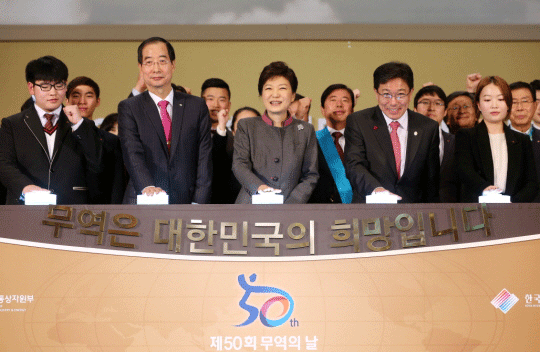
Today’s celebration is particularly meaningful in that Trade Day, which was originally designated as Export Day in 1964 to commemorate the milestone of US$100 million in trade, marked its 50th anniversary this year. It served as a significant opportunity to look back on the trajectory of Korea’s trade over the past half a century, discuss changing trade environments and the country’s capabilities to respond to such changes and renew efforts to carve out the future of Korea’s trade.
In her congratulatory remarks, the President mentioned the achievements of Korea over 50 years of trade, gave an evaluation of the current situation the nation’s traders face and outlined the directions of government policies devised to further boost trade.
Before attending the ceremony today, President Park saw a special exhibition on 50 years of Korea’s international trade, featuring the nation’s key export items from the 1960s until today as well as government records and videos. Looking around the exhibits together with students in their 20s, who will lead Korea’s international trade in the future, the President had frank talks about those who serve as the main pillars of trade.
Right after the ceremony, President Park attended another ceremony to proclaim a vision for rebuilding the nation through trade to open a new era of happiness and shouted a slogan, “A new era of hope driven by trade,” together with 31 people who represent the past, present and future of Korea’s trade.
At today’s Trade Day ceremony, 755 people were awarded the Order of Industrial Service Merit medal and citations in recognition of their contributions to promoting trade. A total of 1,526 companies received Export Tower Awards in 23 different categories based on export levels. In this way, exporting companies received recognition for their hard work and dedication to increasing export volume in the face of adverse external conditions such as the global financial crisis.
In the period from the first annual Export Day in 1964 until 2012, Korea’s trade volume increased by a 19.2 percent average annual growth rate, significantly exceeding the 10.2 percent average annual growth rate of the world economy during the same period. Today, among the countries with export volumes over US$100 billion, Korea holds the record for fastest export growth over the past 50 years.
President Park holds summit with Greek President Karolos Papoulias
President Park noted that the visit by the President of Greece, one of the European countries that had sent troops to fight in the Korean War, was especially meaningful in the year marking the 60th anniversary of the Korean War Armistice. Welcoming him to Korea, President Park said the noble sacrifices of Greek soldiers during the Korean War would never be forgotten.
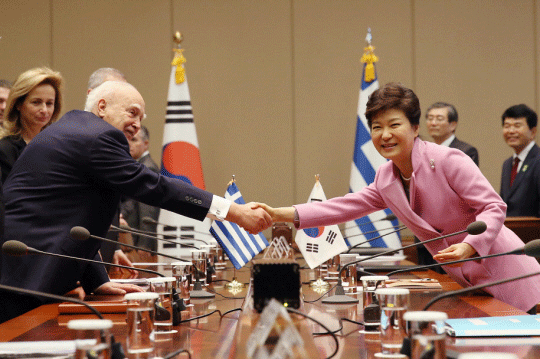
During their summit that was held from at 3:20 to 4:15 on Dec. 3, 2013, President Park Geun-hye and President Karolos Papoulias of the Hellenic Republic had useful discussions on a wide range of issues. These included the latest developments surrounding the Korean Peninsula and in the European Union as well as ways to enhance substantive cooperation in various fields such as political affairs, trade and the economy, investment, infrastructure, information and telecommunications technology and national defense.
President Park stressed the fact that Greece had played a critical role in the development of Korea’s shipbuilding industry and that it is still the largest destination for Korea’s ship exports. She asked President Papoulias for his support and interest so that mutually beneficial cooperation between Korea, a leading shipbuilding power, and Greece, a global powerhouse in the shipping industry, would continue to deepen.
President Papoulias said that the robust friendship between the two nations had been forged in blood and that the sacrifices of young Greek soldiers had served as the foundation for mutual understanding and friendly cooperation. The Greek President went on to express the hope that Korea would provide support for Greece to overcome the current economic crisis and that Korean businesses would make increased investments, particularly in the shipbuilding sector where the two countries have actively worked together.
In regard to Greece's assumption of the presidency of the European Union starting in January 2014, President Papoulias said the focus would be placed on economic growth and employment. He also expressed the hope to work together with Korea in science and technology, including IT, and natural gas projects, for which Korean businesses are well known in Europe. The two Presidents concurred on the need to form a consultative body to discuss concrete ways for collaboration.
President Park noted that the Greek economy has recently taken a turn for the better and that the Korea-EU FTA would help boost trade and investments between Korea and all members of the European Union, including Greece. In this connection, President Park called on the visiting President to work for the early completion of the ratification procedure in Greece.
Taking note of the need to address difficulties Korean businesses face when entering Greece in regards to visas and taxes, President Park asked President Papoulias to take interest in helping Korean businesses to take part in his nation’s privatization of state-owned enterprises in the areas of airports, ports and railways and in building transport infrastructure, including subways.
In response, the Greek President said that Korean businesses’ interest and participation in the privatization and the construction of public infrastructure in Greece were of enormous significance. The President went on to say that he would personally take care of tackling difficulties facing Korean businesses.
On the topic of North Korea, President Park thanked Greece for its role in jointly introducing a resolution denouncing North Korea’s nuclear program at the last regular session of the International Atomic Energy Agency General Conference. She also expressed gratitude for Greece’s continued support in efforts to persuade North Korea to come forward as a responsible member of the international community.
In response, President Papoulias said that the Greek Government was observing the situation in Northeast Asia very closely and would continue to stand in partnership with Korea. He also said that he would support the position of the Korean Government at the European Council meetings, especially during 2014 while he is president.
The Greek President next extended an invitation to President Park to visit Greece. President Park agreed to visit at a mutually convenient time and proposed that arrangements be made through diplomatic channels.
After the summit, the two leaders looked on as Vice Minister of National Defense for the Republic of Korea Baek Seung-joo and Deputy Minister of National Defence for the Hellenic Republic Athanasios Davakis signed an agreement for the protection of classified military information.
President Park visits Job Fair for Part-timers with flexible
working hours
The job fair, the first of its kind, was jointly hosted by the Ministry of Employment and Labor, the Ministry of Strategy and Finance and the Ministry of Gender Equality and Family. It was sponsored by 82 companies from the top 10 conglomerates in Korea and is expected to result in the hiring of approximately 10,000 part-time workers.
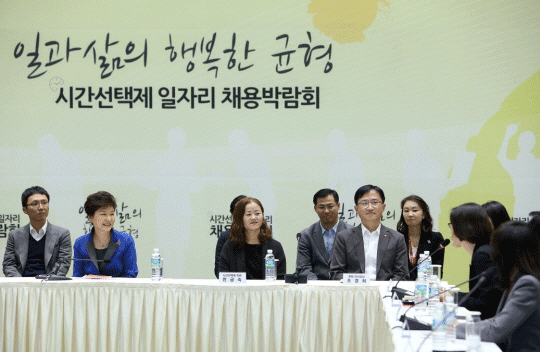
President Park Geun-hye participated in a job fair held at COEX in Seoul on Nov. 26, 2013. The job fair was designed to promote part-time jobs with flexible working hours and employee benefits. There, President Park visited with job seekers, those who are currently working part-time jobs and human resources managers in businesses. The President also held a town hall meeting with participating business leaders and female job seekers who have had their careers interrupted. The new system of part-time jobs with flexible working hours guarantees workers basic labor rights and allows them to choose their own working hours while not being discriminated against in terms of the company welfare and benefit plans. The promotion of these kinds of jobs is one of the key administrative priorities of the Park Geun-hye Administration.
On top of this, the job fair will serve as an opportunity to promote the idea that in the era of the creative economy when the importance of software industry, R&D and creative ideas increases, competitiveness is determined not by just working long hours as in the past but by how intensively and creatively one works. By doing so, it will help drastically change the negative perceptions toward the flexible work system and further spread it, while weakening the custom of working long hours.
By conducting job analyses taking into account the demand of job seekers, participating businesses plan to identify job opportunities befitting the flexible work system and hire in about 150 job categories such as customer service and sales as well as in specialized jobs, including psychological counseling, translation and law.
The theme of today's fair was "Jobs with Flexible Working Hours for a Happy Work-life Balance." In addition to visiting various company booths to observe actual interviews and other parts of the hiring process, President Park visited the fair's childcare room, set up for the convenience of female job seekers whose careers were interrupted when they gave birth. She also heard from job seekers about the difficulties of finding employment.
The policy for flexible working hour jobs is in line with the Park Geun-hye Administration's emphasis on open-minded governance, which has also been described in terms of related keywords such as efficiency, creativity and a paradigm shift. Now a major administrative priority, the promotion of flexible working hour jobs supports increased compatibility between work and family life and seeks to offer the kind of employment arrangement that is most needed in these changing times.
President Park holds Summit with Laotian President Choummaly
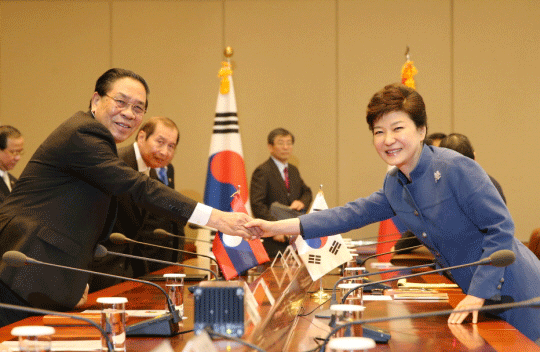
It was followed by an official luncheon at Cheong Wa Dae.
President Choummaly was the first Laotian President to visit Korea. During their meeting, they had in-depth discussions on a wide range of issues, including ways to enhance bilateral exchanges and cooperation in such varied areas as political affairs, the economy and trade, development cooperation and cultural and people-to-people interaction. They also discussed the latest developments surrounding the Korean Peninsula and in other regions as well as key international issues.
The two heads of state noted that in the less than 20 years since the reestablishment of diplomatic ties, bilateral relations have made remarkable progress in such diverse fields as exchanges of senior-level officials, trade, investment, culture and tourism. With President Choummaly’s historic visit as a catalyst, the two leaders agreed to continue to elevate friendly and cooperative relations between the two nations.
They reached an agreement to further promote mutual trust and friendship by means of reciprocal visits by high-ranking officials. They also welcomed the signing of an MOU on exchanges and cooperation between the political parties of the two countries on the occasion of President Choummaly’s visit. In addition, the two heads of state concurred on the need to further exchanges and collaboration in the defense sector. To this end, they agreed to begin consultations on the assignment of military attach?s in their respective embassies.
The two leaders had good discussions on issues of mutual interest, including the necessity of increasing bilateral trade, expanding Korean business investment in Laos in more diverse areas and stepping up collaboration in such fields as energy, resources, labor, aviation, development cooperation, education, culture, tourism and people-to-people exchanges.
President Park asked the Lao Government to take continued interest in the various difficulties facing Korean businesses stemming from the convoluted process of hiring foreign workers and obtaining financing within the country, and she proposed that they work together to tackle them. In response, the visiting President said that he would make unceasing efforts to improve the investment environment so that businesses from Korea, the fourth largest foreign investor in Laos, would be able to continuously contribute to his country’s economic progress and development in the days ahead.
Noting that Laos has enormous potential in water and natural resources development, President Park called on President Choummaly to collaborate to facilitate hydropower plant construction and mineral resources development projects, in which Korean businesses are participating. The President went on to ask for lasting interest and cooperation from the Lao Government so that more Korean businesses would be able to take part in projects in those sectors.
On his part, President Choummaly first expressed his profound appreciation to the Korean Government for supplying official development assistance, and he continued to express hope that the Korean Government would make continued contributions to his country. Touting Korea’s development as an outstanding development model, he said Korea’s Saemaul Undong (New Community Movement) would serve as a good reference in pushing ahead with rural development in Laos. The visiting President continued by expressing his hope to learn many lessons from Korea’s experiences.
Next, the two leaders stressed the importance of cultural and people-to-people exchanges in promoting friendship and mutual understanding between Korea and Laos. Along these lines, they agreed to support efforts to further exchanges in culture, including the exchange of performing arts troupes in 2015 to commemorate 20 years of diplomatic ties.
In addition, the two leaders agreed to deepen bilateral cooperation and mutual assistance at not only the regional level, through forums such as ASEAN, but also the broader international level through the United Nations and ASEM. President Choummaly also gave his assurances of willing cooperation for the success of the ASEAN-Korea Commemorative Summit to be held in Korea in December 2014.
On the topic of North Korea, President Park noted that Laos had expressed concern over North Korea’s long-range rocket launch in December 2012 as well as its third nuclear test in February of this year, and she explained to the Lao President the current state of affairs on the Korean Peninsula. President Choummaly, who made reference to the Lao Government’s consistent support for denuclearization on the Korean Peninsula, affirmed that Laos would contribute what it could for the cause of peace and stability on the Peninsula.
President Choummaly also expressed gratitude at the warm welcome shown to him by the Korean Government and people during this visit, and he invited President Park to visit Laos at her convenience. President Park expressed her thanks for the invitation.
President Geun-hye meets with IOC President Thomas Bach
Dr. Thomas Bach was elected as the ninth President at the 125th IOC Session on Sept. 10, 2013. He is the first Olympic gold medalist to become the IOC President. He won gold in the team foil event in the 1976 Montreal Olympics. With his motto “Unity in Diversity,” IOC President Bach is working to make the Olympics more open to anyone and any cultural sphere around the world for the harmony of all.
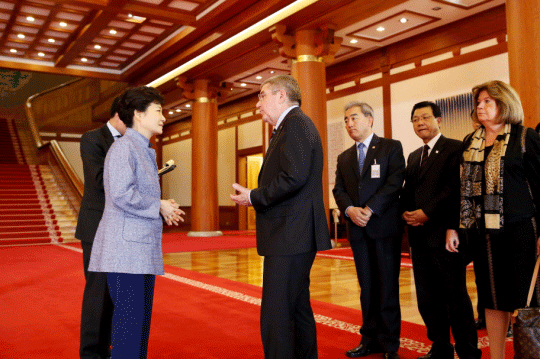
The meeting was a courtesy call by IOC President Bach on President Park as the head of state of the host nation of the 2018 PyeongChang Olympic Winter Games. During the meeting, they discussed how to work together for the success of the 2018 PyeongChang Olympics and ways to increase people-to-people exchanges between Korea and the IOC.
The IOC President has made three prior visits to Korea. He attended the 109th IOC Session in Seoul in June 1999, followed by the 15th General Assembly of the Association of National Olympic Committees in Seoul in April 2006. In August 2011, he attended the 13th IAAF World Championships in Athletics in Daegu. Dr. Bach has been described as having a special affinity with Korea and once referred to the joint entrance of South and North Korean athletes at the opening ceremony of the Sydney 2000 Summer Olympic Games as one of the most moving moments of the Olympics.
Accompanying the IOC President at today's meeting were Gunilla Lindberg, Chairperson of the Coordination Commission for the PyeongChang 2018 Winter Games, and Christophe de Kepper, Director-General of the IOC. Attending on the Korean side were Minister of Culture, Sports and Tourism Yoo Jinryong, Korean Olympic Committee President Kim Jung-Haeng, President and CEO of the PyeongChang 2018 Organizing Committee Kim Jin-Sun and Korean Olympic Committee Vice President Cho Yang-ho.
President Park holds summit with President Almazbek Atambaev
of the Kyrgyz Republic
President Park Geun-hye met with President Almazbek Atambaev of the Kyrgyz Republic today at Cheong Wa Dae on Nov.19 2013. He is the first Head of State in Central Asia to make an official visit to Korea since the Park Geun-hye Administration was inaugurated. During their summit, the two leaders discussed how to boost substantive cooperation in a wide range of areas, including bilateral relations, the economy, trade, energy, resources, agriculture and development cooperation as well as people-to-people exchanges. Their discussions also covered recent developments surrounding the Korean Peninsula and other regions as well as ways to work together in the international arena.
President Park explained how important it is for the Korean Government to seek ways to promote coprosperity and work together with Central Asian countries in the process of achieving strengthened Eurasian cooperation, a key policy objective. Concurring on the importance of this objective, President Atambaev stressed the necessity of bolstering existing bilateral collaboration in the Central Asian region.
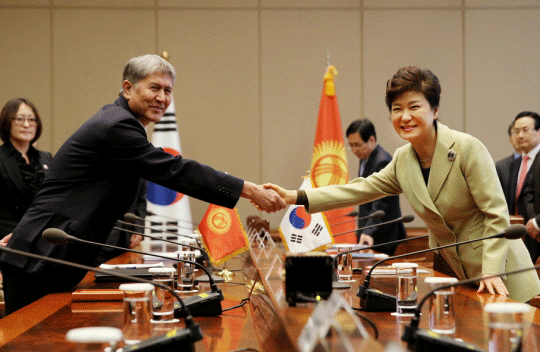
Noting the progress in bilateral ties since the establishment of diplomatic relations in 1992, the two heads of state had in-depth discussions on how to promote future-oriented and qualitative development in the relationship between the two countries. They also gave high marks to the fact that mutual understanding and collaboration between Kyrgyzstan and Korea have been greatly enhanced on the basis of the common values of democracy and a market economy.
President Park expressed her high regard for Kyrgyzstan's efforts to promote democratization. She also expressed the hope that the two nations would be able to advance a future-oriented and mutually beneficial relationship in the coming years and beyond on the strength of the recent expansion of institutional frameworks for bilateral cooperation and an increase in substantive cooperation in development and agriculture, including loans and grants.
President Atambaev emphasized that Korea is an important country to Kyrgyzstan as an exemplary model of freedom and democracy. He added his wish that the summit this time would serve as a catalyst for reinforcing substantive cooperation between the two countries.
Notably, President Atambaev said that he understood well the excellence of Korea's election and voting system and that he hoped Korea would provide system-related support for Kyrgyzstan to conduct fair elections.
President Park noted that Kyrgyzstan had outstanding human resources and development conditions as well as huge potential as a gateway leading to Central Asia, Europe and China. Regarding trade between the two nations that has seen a 160-fold increase over the past 20 years since the establishment of diplomatic relations, President Park expressed the hope that economic cooperation and investments between the two nations would be further promoted.
For the sake of boosting Korean businesses' investments in Kyrgyzstan, President Park said that she hoped that difficulties such as those stemming from the process of collecting payments would be properly addressed so that Korean businesses could operate in a more secure environment. In response, President Atambaev said that he would redouble efforts to work together in that regard.
Welcoming the signing of an MOU on cooperation in rehabilitation of mining wastes and environmental restoration, President Park expressed the hope that the MOU would help lay a cornerstone in ensuring environmentally friendly development of resources and environmental safety in mines in Kyrgyzstan and further promote substantive collaboration between the two nations.
In addition, President Park asked her counterpart to work together to make sure that resource development projects by Korean businesses such as the construction of ferroalloy and magnesium plants in Kyrgyzstan could progress smoothly. Mentioning his nation's huge potential in the energy sector, especially in hydropower generation, the visiting President looked forward to increased cooperation in the sector.
President Park said that the Korea-Kyrgyzstan Agricultural Center that opened last year was serving as a training center for the modernization of farming in Kyrgyzstan. The President expressed the hope that the center would play a pivotal role in enhancing bilateral agricultural cooperation such as the dissemination of greenhouse technologies to Kyrgyzstan.
The President went on to welcome the Kyrgyzstan's intentions to join the Asian Food and Agriculture Cooperation Initiative (AFACI). In addition, the President hoped that agricultural technology cooperation between the two nations through AFACI would help address Kyrgyzstan's pending issues in farming and jointly respond to the issues of food security in Asia and climate change, thereby making it possible to achieve shared progress.
President Atambaev noted the efforts being made by the Korean Government to expand exchanges between the people of their two countries, mentioning the recent opening of the Korea Center at the National Library of Kyrgyzstan as one example. He continued by expressing his hope that conditions would be created that would give the Kyrgyz people more exposure to the Korean language and also Korean culture.
President Park, on her part, said she looked forward to seeing the growth of mutual understanding through cultural exchanges, making another reference to the newly opened Korea Center as well as a joint exhibit organized by artists of the two countries.
Next, the President thanked the Kyrgyz Government for its consistent support of the Korean Government's position with regard to the situation on the Korean Peninsula, including its release of a statement last March condemning North Korea's nuclear test. She also explained the Korean Government's trust-building process on the Korean Peninsula and Eurasian Initiative to the Kyrgyz President, who responded with his support.
With regard to the Eurasian Initiative in particular, President Atambaev said he strongly supported President Park's vision, especially her idea to pursue creation of a Silk Road Express that would connect the Eurasian region by rail. President Park said it would be good for their two countries to not only deepen cooperation and mutual assistance as regional partners but also work more closely together in the United Nations and the international arena.
President Atambaev also took time to remark on the Korean people's love of freedom and their diligent character, saying these were things he hoped to learn from. Mentioning German Chancellor Angela Merkel, President Atambaev said that President Park gave him a similar impression of possessing not only beauty but also a resolute inner strength, and he reiterated his support for the trust-building process on Korean Peninsula.
Before the close of the summit, President Atambaev extended an invitation to President Park to visit Kyrzygstan at her convenience. President Park responded with gratitude, saying that she hoped to make a visit. K

